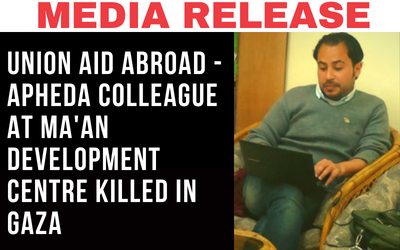FRESH AIR
Problems adding up for Australian aid to Palestinian Territories
June 29, 2018 | Naomi Levin

As things currently stand, there are doubts over the integrity of three separate Australian-funded development programs in the Palestinian Territories. There are also long-term concerns over funding for the UN Relief and Works Agency (UNRWA).
Australians are waiting for answers from Foreign Minister Julie Bishop and officials in the Department of Foreign Affairs and Trade (DFAT) about possible terrorism links in two separate Palestinian aid programs. The first relates to Australia’s contribution towards the Palestinian Authority’s budget and whether that contribution may be supporting the Palestinian Authority’s so-called ‘martyrs’ fund’. The second relates to how it came to be that an Australian-funded development program employed at least one leading figure from a declared terrorist group.
As far as we are aware, Australian Government funding to large local charity World Vision also remains suspended following unresolved allegations that the group’s Gaza director diverted funds to Hamas. How has our Palestinian aid program ended up in this dire situation?
On June 28, The Daily Telegraph revealed that one of the terrorists killed in Hamas’ ‘March of Return’ on the Gaza border in May was in fact an employee of the MA’AN Development Centre, a recipient of Australian aid with offices in Gaza and the West Bank.
It was no secret that Ahmed Abdullah Al Adine was a commander in the Popular Front for the Liberation of Palestine – his own Facebook page declared it.
It was no secret that this same person was employed as a field officer at the MA’AN Development Centre in Gaza – MA’AN’s own website declared that.
It was also no secret that the Australian Government provides ongoing funding to MA’AN to support Palestinian farmers via Sydney-based charity Union Aid Abroad-APHEDA – it is mentioned on DFAT’s own website.
So why – as revealed on Sydney radio by the journalist who wrote The Daily Telegraph story – had the Government not investigated this funding, reported at around $21 million, until a reporter started asking questions?
Why also did Union Aid Abroad-APHEDA, which is proudly supported by prominent Labor Party identities and the country’s largest trade unions, publish a statement mourning the loss of a man who it must have known had strong terrorist links? In fact, the only other English-language statement that mourned Al Adine’s loss came from the PFLP itself. That statement called Al Adine a “martyr”, who participated “in the marches to the colonial fence … toward our occupied Palestine”.
This bizarre and unfortunate situation follows Foreign Minister Bishop’s recent decision to seek assurances from her Palestinian counterpart about the destination of Australia’s aid dollars.
She asked Palestinian Authority Foreign Minister Riyad al-Maliki to confirm that Australian funding to the PA – approximately $10 million this year – does not in any way enable or encourage acts of violence. It is not known whether a response has yet been received.
Bishop’s letter was likely prompted by Israeli Prime Minister Benjamin Netanyahu’s revelation that up to 10% of the Palestinian Authority’s budget – or around $477 million – is used to compensate terrorists who commit attacks against Israel, or given to their families if they have died in their heinous undertakings.
Netanyahu said: “I believe President Abbas should find better use for this money—to build roads, schools, hospitals, factories. Build life, don’t pay death. Invest in life. Invest in peace.”
Fortunately, the Australian Government seems to share that belief.
Still lingering in the background is the unresolved court proceedings of Mohammad el-Halabi, who is facing charges in Israel for allegedly diverting World Vision funds to the terrorist group Hamas.
While a DFAT internal inquiry was completed in 2017 and found “nothing to suggest any diversion of government funds”, the Australian ambassador to Israel at the time, Dave Sharma, said DFAT’s finding was not an assessment of el-Halabi’s innocence or guilt and while the court deliberated, funding to World Vision would remain suspended.
On top of all of these concerns are the ongoing and troubling terrorism and extremist links of the UNRWA to which Australia contributed $22.5 million in 2016-17.
While successive reviews by DFAT have given these programs the tick of approval, it is quite clear that there are unresolved problems in Australia’s aid program in the Palestinian Territories.
There is no doubt that the Palestinian people need assistance to create a better life and that international aid, properly directed, may help contribute to an eventual two-state resolution. The Palestinians are unfortunately saddled with undemocratic leaders who are more concerned with killing Israelis and fighting destabilising internal political and territorial battles than ensuring families have access to food and basic services.
Australia, as a wealthy, lucky country, has a role to play in lifting the living standard of Palestinian people, but the flow of taxpayer funds must be closely monitored. If some of that money is reaching terrorist causes, it is not only both an unconscionable use of public money and scandalously counterproductive, but would likely place at risk all Australian aid to the Palestinians. Continuing that aid is in the interests of Palestinians, of Israelis, and of Australia’s bipartisan foreign policy goals in the Middle East – but not if it any portion of it ends up in the hands of terrorist groups or in providing incentives for terrorist activities.
Tags: Australasia, Australia, NGOs, Palestinians, United Nations
RELATED ARTICLES

US Middle East strategy amid regional instability: Dana Stroul at the Sydney Institute

Antisemitism in Australia after the Bondi Massacre: Arsen Ostrovsky at the Sydney Institute





















